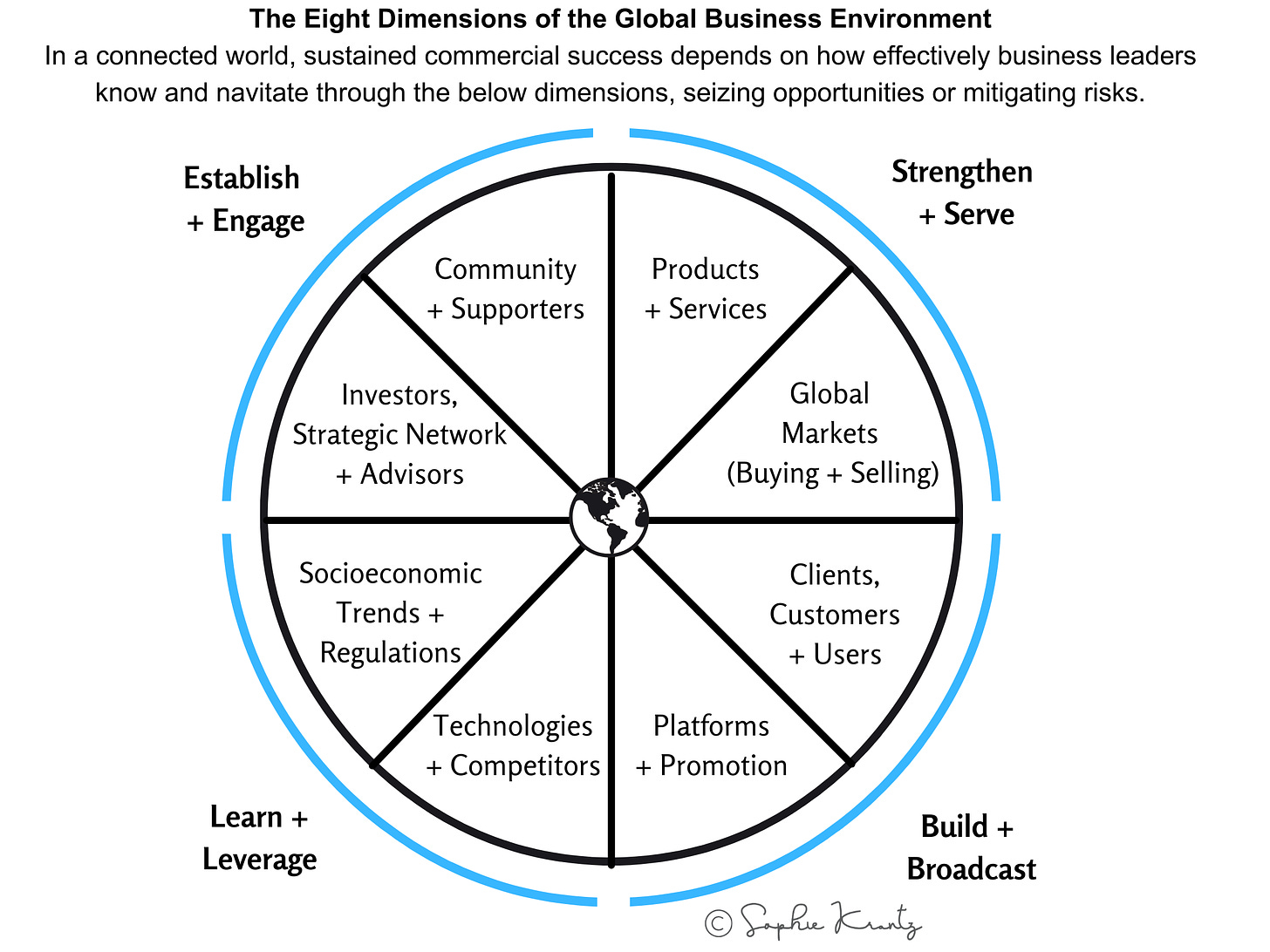
Embracing the Dragon: How to Lead with a China-Informed Business Strategy
The Lunar New Year, engaging about two billion people worldwide, prompts reflection on China's significance for business strategy, underscoring the necessity of a comprehensive understanding despite potential challenges or biases.
(adapted from here)
Early February marked the start of the Lunar New Year, a celebration that engages about two billion people worldwide, including 1.5 billion in China alone. For business leaders, this cultural moment offers a unique opportunity to reflect on a broader question: What significance does China hold for you and your business strategy?
Leading Without the Full View
In working with emerging leaders, one of the few non-negotiables I hold: being informed about and connected to China. Understanding China's influence on global industries, economies, and geopolitics is indispensable. Overlooking China's role or lacking a network for strategic insights creates a significant blindspot in a leader's global perspective. Leading with an incomplete view of such a strategically vital market is a considerable risk.
I confess, I'm not a China expert - nor do I need to be. I draw on a network of former colleagues, current clients, and recognised experts.
Given the complex array of obligations that leaders face today, the question arises: Even if China is not a direct market priority, concerns of IP theft dissuade engagement, or the influx of ‘cheap imports from China’ don't pose a threat, is a deep understanding still necessary? I firmly believe it is.
It's Chaos Out There
The principles of Chaos Theory, illustrating how minor events can trigger significant global impacts, highlight the necessity of a global perspective in business. Actions in one country can unpredictably affect another, emphasising our interconnected world's complexity. Therefore, ignoring international dynamics, including those related to an economic superpower such as China, can lead to unintended local consequences.
Eight Dimensions of the Global Business Environment
There are eight key dimensions that offer valuable insights into navigating the global business environment, as shown below.

The eight dimensions of the global business environment form a contextual framework for navigating these complexities. They include adaptive products and services, a strategic understanding of global markets, and a deep connection with existing and emerging clients. Awareness of current and new competitors, emerging technologies, socioeconomic trends, and regulatory environments is essential for market access and consumer, customer, or client relevance. A strong network of investors, advisors, and community engagement can provide the foundation for business growth, resilience, and brand loyalty.
These dimensions collectively offer a strategy to succeed among constant shifts in the global economy. In this landscape, China's role is pivotal, demanding attention not just as a market force but as a key influencer. Its strategic maneuvers and policies are crucial in shaping an informed and responsive global business strategy.
Leading Beyond the Headlines
While China's recent portrayal in the media has been predominantly negative, particularly post-COVID-19, this does not fully encapsulate its role on the global stage. The complexity of China's economic policies, cultural dynamics, and technological advancements requires a nuanced understanding beyond the headlines. Recognising the strategic value of China, beyond the negative narrative, is imperative for informed leadership.
Pick Your Worldview: Without China or With China
How we see the world shapes our competitive advantage. Contrasting a worldview with and without China starkly illustrates the importance of including China in strategic considerations. Excluding China is like navigating without full visibility, missing out on vast opportunities and insights. Conversely, integrating a comprehensive understanding of China into business strategies enables leaders to align with global economic trends, geopolitical threats, and technological advancements, safeguarding not just domestic success but sustained global results.
Incorporating China into your strategic outlook is particularly beneficial when it’s tailored to the specificities of an industry, its competitive dynamics, and the local and global impact of geopolitical events. Understanding China’s global impact is crucial for anyone in a leadership role for a number of reasons.
8 Key Reasons to Have a China-Informed Business Strategy
Below are eight key reasons to have strengthened awareness of China. Eight, of course, being a lucky number in China. There are more and these will evolve over time. This provides a current, high-level snapshot, to illustrate the impact of China on the world stage:
- Market Opportunities: China has an enormous consumer base, including a rapidly growing middle class and significant generational shifts, presenting significant opportunities. The demographic landscape features four generations making up 80 per cent of the 1.4 billion population, each with distinct consumption patterns. This diversity offers a wide array of market opportunities across various sectors. Despite domestic economic contraction, the country saw an increase in nominal disposable income per capita by 6.5 per cent in the first six months of 2023, and online retail sales reaching 14 trillion yuan in the first 11 months of 2023, marking an 11 per cent increase.
- Innovation and Competition: China is innovating at speed. The country had over 4 million valid domestic invention patents by the end of 2023, establishing it as a global leader in intellectual property filings. The country received 1.586 million invention patent applications in 2021 alone, with a significant year-on-year increase of 5.9 per cent. These milestones reflect China’s ambitions to bring innovations into the global marketplace.
- Strategic Business Environment: Foreign companies have long sought to strengthen their competitive muscle within China. Trade agreements between China and various countries, including ASEAN members, Singapore, Pakistan, New Zealand, Chile, Peru, Switzerland, South Korea, and Australia, facilitate this process. These agreements, along with incentives like tax breaks and relaxed travel and visa policies, has made China an attractive destination for investment and business operations. Despite a recent trend of foreign investment outflow - partially driven by strategies to circumvent tariffs and sanctions - the shift towards a 'business with China' approach signifies a broadening perspective, focusing on global collaboration rather than solely on operations within China itself.
- Supply Chain Influence: China's manufacturing and service sectors are crucial in meeting global demand, and it is known as a key player in the global supply chain. This model continues to evolve as the world changes. A "China+N", described by McKinsey, is an approach for companies manufacturing in China for global distribution to diversify their supply chains. It involves either finding new suppliers outside China or expanding manufacturing with current Chinese partners into other countries. This strategy reduces risks related to regulatory changes, tariffs, and supply chain disruptions, ensuring operational resilience.
- Global Economic Influence: As a leading global economic power, China's economic health and policies have far-reaching implications. China's commitment to technological innovation and a history of boosting domestic demand has cemented its position in shaping global economic trends. China's role in the WTO and other international bodies impacts global economic policies and trends. It takes a stance in shaping international economic governance. Understanding the implications and engaging with China to influence important global economic policies can be of strategic importance.
- Hub of Technological Advancement: China is investing in emerging industries and digital megatrends to position itself as a global innovation hub. Home to giants like Alibaba and TikTok owner ByteDance, there is a push towards AI, quantum information, and biological manufacturing. R&D spending for science and technology had been tracking at 7 per cent each year, since 2021, however current economic contraction in China may see this rate decline.
- Ambitious Planning: China plans for the future. The 14th Five-Year Plan, spanning 2021-2025, outlines China's vision for sustainable, innovative development, emphasising high-quality green growth and technological advancement.
- Global Expansion Initiatives: The Belt and Road Initiative illustrates China's efforts to extend its global influence, promoting economic cooperation and creating alternative trade networks. This initiative, along with maritime expansions, highlights China's strategic ambition and its critical role in international politics and economics.
Integrating for China-Informed Leadership
An expanded worldview allows leaders to assess the impact China has on every aspect of business, locally or globally. From the vast market opportunities presented by its diverse population to the strategic implications of its ambitious five-year plans, China's influence is both broad and deep. As a business leader, recognising this impact is not just about crafting a reactive strategy - it's about shaping a proactive, informed approach that leverages China's economic size and innovative momentum. This understanding serves as a foundation for not only navigating the present but also for anticipating the future, ensuring leaders are equipped to meet the challenges and seize the opportunities that China's evolution presents in the global arena.
How to Become China-Informed?
As we welcome the Year of the Dragon, it's valuable to assess how 'China-informed' we are. Engaging with the global Chinese community and understanding China's economic policies and market dynamics are foundational steps. Leaders should consider pursuing further education on China, engaging in deep market research, and exploring strategic partnerships to strengthen their understanding of China's global influence.
Reflective Question:
Consider your ambitious goals for 2024. What impact does China - within China or globally - have on your worldwide success?
新年快乐! Xīn Nián Kuài Lè! Happy Lunar New Year!
Further Reading:
- ‘The Next Chapter in China’s Consumer Story,’ by BCG (link here)
- ‘Supply chain resilience - in China and everywhere else,’ by McKinsey (link here)
- ‘Chain reaction: The China link in global supply chains,’ by Deloitte (link here)
- ‘China’s approach to global economic governance,’ by Chatham House (link here)

Register for the Exponential Technologies self-paced course
AVAILABLE NOW ON THE OPENEXO LEARNING HUB
ExO Insight Newsletter
Join the newsletter to receive the latest updates in your inbox.









